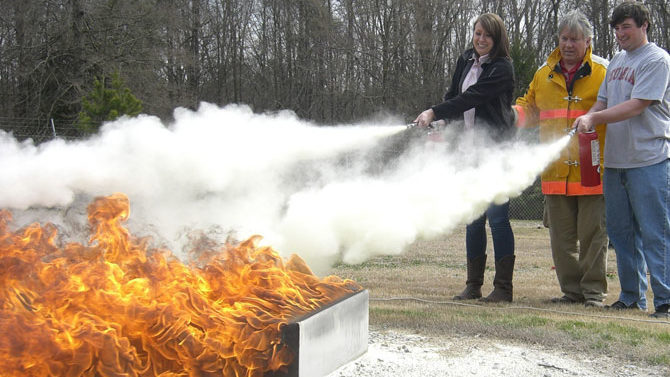The storm seems to have passed over, and you’re looking at the huge branch that’s caved in a section of your roof. Several of your neighbors are out doing the same. You step out to the curb to take a look down the street and you see them—two people in green vests and hard hats, with clipboards and heavily-loaded backpacks. Are they some new kind of evangelists? Developers looking to buy your damaged property on the cheap?
“We’re from the Community Emergency Response Team,” they say. “We’re here to help.”
What Is CERT?
CERT was the brainchild of the Los Angeles Fire Department. Founded in the mid-1980s, the program recruits and trains volunteers to take some of the huge volume of less-hazardous, less-specialized work off the shoulders of professional emergency managers and first responders. CERT volunteers can help set up and run shelters, coordinate offers of assistance with areas of need, take part in searches and evacuations and assess property damage. They can also serve food to evacuees and rescue workers and help with cleanup after floods or other disasters.
In calmer times, they assist in community events, staff first aid booths, help formulate and practice disaster plans, play victims in police and emergency drills and improve emergency preparedness in their own families, workplaces and neighborhoods.
If you’ve ever yearned to attack a column of flame with a fire extinguisher, search the woods for a missing person or spend an afternoon drenched in fake blood while police officers search for the guy who ‘shot’ you—good news. Your chance is coming. Both the University of Georgia and Athens-Clarke County will offer CERT classes beginning in September.
Basic CERT training consists of eight weekly classes, two-and-a-half hours each. Training is free; classes are funded by a federal Citizen Corps grant. Topics may very depending on local needs. UGA’s classes include the Incident Command System, disaster preparedness, disaster medical operations, basic fire safety and suppression, light search and rescue, terrorism and disaster psychology.
The Incident Command System is the answer to the problem faced by emergency responders from different places and organizations who found their relief efforts hampered by dueling chains of command, mutually unintelligible codes and overextended supervisors. FEMA calls ICS “a standardized, on-scene, all-hazards incident management approach” used by “all levels of government—federal, state, tribal and local—as well as by many nongovernmental organizations and the private sector.” It’s used not only in disasters but to manage large events like parades and football games and in training exercises. It’s streamlined, light on jargon and easy to learn, and since 2006 it’s been a mandatory standard for disaster response.
Other classes include:
• Disaster Preparedness, an overview of recent and common disasters, hazards, and how to prepare your home and workplace for possible disasters.
• Disaster Medical Operations gives an overview of common injuries, first aid, and pre-hospital triage.
• Fire Suppression covers basic fire safety, types of fire extinguishers and hands-on training in their use.
• Light Search and Rescue teaches students how to set up and carry out search patterns, indoors and out, with hands-on practice.
• Terrorism and Active Shooters covers terrorist threats and targets and active shooter events
•Disaster Psychology discusses the psychological well-being of responders and victims and resources for help after a disaster.
The class ends with a simulated disaster for which students must organize and carry out the response as a team. After graduation, CERT members can also access more in-depth training in a variety of skills, from ham radio operation to CPR and AED training.
UGA has had an active CERT since 2008. Led by Emergency Operations Coordinator Pete Golden, the team is mainly focused on preparedness—helping members, their families, neighbors and co-workers prepare for various potential emergencies. UGA CERT members have been staffing the first aid booths at the Stadion Golf Classic since its inception. They also frequently play “victims” in training drills for UGA and Athens-Clarke County police and even the FBI.
What CERT Does
In the event that Athens becomes an evacuation site after a hurricane or other disaster, UGA CERT will set up and operate a pet shelter. Passed in the wake of Hurricane Katrina, the Pets Evacuation and Transportation Standards (PETS) Act requires states receiving FEMA funding to incorporate pets and service animals into their disaster evacuation plans.
“The Department of Agriculture offers classes on how to run a pet shelter,” says Golden. “They basically have a shelter-on-a-truck. The [UGA] vet school does all the hands-on care of the animals, and we do everything else: setting up cages, intake, taking photos and so on.”
An exercise in August 2012 using stuffed animals gave the team an opportunity to practice in case a pet shelter is needed.
But the most likely scenario for UGA CERT mobilization, Golden says, would be “a missing person on university property, for example at the Botanical Gardens. We’d be acting as support, helping with the command post, feeding volunteers and answering phones.”
Golden encourages more involvement in disaster preparedness. “This is something anybody can do, and everybody should do,” he says. “Everybody should have some level of preparedness; for example, making sure you and your family have supplies on hand to take care of yourselves for at least three days. Look at our website—you can participate as much or as little as you like, but those skills will always be with you. I get letters from people who went through our CERT class and then came up on a wreck or saw someone collapse in a restaurant. They write me to say ‘Thanks to my CERT training, I knew what to do.'”
For those not affiliated with the university, the Athens-Clarke County CERT, which has been on hiatus recently, is about to be reborn. Beth Burgess is the county’s new Emergency Management Administrator, on the job since December 2012.
“EMA in the past has not been very proactive. I intend to change that,” Burgess says. Working with the county’s Citizen Corps Council, Burgess plans to incorporate CERT into her office’s routine.
“I’m a department of one, so I depend heavily on volunteers,” she says. “I plan to establish a volunteer cache of citizens to assist with emergency operations—things like damage assessment, animal response teams, getting people to staff the emergency operations center and so forth. We plan to bring programs like CERT and the Medical Reserve Corps together and do a lot of cross-training.”
Be Prepared
September, which is National Preparedness Month, will see CERT training for both UGA and Athens-Clarke County (“free for anyone who lives, works or worships in Athens-Clarke County,” according to Burgess) as well as UGAs preparedness fair. Here are the details, along with some online resources you may find helpful.
Athens-Clarke County Citizen Preparedness class: tentatively scheduled for Sept. 21. Check the county’s EMA website or contact Beth Burgess at 706-613-3410 or beth.burgess@athensclarkecounty.com
The University of Georgia fall CERT class will run from Sept. 17-Nov. 5. Contact Pete Golden, pgolden@uga.edu
University of Georgia Preparedness Fair: Wednesday, Sept. 11 from 10 a.m.-noon at the Tate Center Plaza. Emergency vehicles on display, first responders available to answer questions, and tables sponsored by various organizations with information on emergency preparedness.
FEMA’s Citizen Corps page: preparedness advice, volunteer opportunities, links to online courses.
Ready Georgia: tips for personal and family preparedness, links to community events.
UGA Office of Emergency Preparedness: emergency planning, campus resources, upcoming classes and training.
ICS-100 online course: Introduction to the Incident Command System, a prerequisite for UGA’s CERT training.
Like what you just read? Support Flagpole by making a donation today. Every dollar you give helps fund our ongoing mission to provide Athens with quality, independent journalism.








